Russian death camp: Three stories of Ukrainian prisoners
How Ukrainian prisoners are tortured and killed—stories from one Russian detention center.
At first glance, Vyazemskoye Detention Center-2 appears to be an ordinary facility within the Russian "penitentiary" system. However, in reality, it can be boldly called a "death camp."
The Russians have proven to be much more cunning and more intelligent than the Nazis during World War II, who built specialized facilities to exterminate their enemies.
Officially, the Russians do not have specialized facilities for holding Ukrainian prisoners. It is as if no one is in Russian captivity. They have simply "scattered" Ukrainian prisoners across their detention facilities, where, far from human eyes, they physically and mentally break and destroy them.
Texty.org.ua decided to investigate one specific place where Ukrainian prisoners are tortured. This is Vyazemskoye Detention Center-2—a seemingly unremarkable facility that has become a place of torture for Ukrainian prisoners.
While working on this material, we discovered another problem—the Ukrainian government's unpreparedness to clearly emphasize that today, we are dealing with mass crimes against humanity.
A paradoxical situation has arisen: due to bureaucracy, Ukrainian officials simply copy the falsified diagnosis given by enemy doctors, instead of providing their own definition of what caused the person's death and, ultimately, calling the crime a crime.
Ukrainian officials simply copy the falsified diagnosis given by enemy doctors
Unfortunately, Ukrainian officials are essentially confirming another Russian lie, claiming that another Ukrainian prisoner simply died of "tuberculosis."
At the same time, the official Ukrainian forensic examination ignores the fact that the Russians did everything possible to destroy people and that tuberculosis is a consequence of the torture and abuse that Ukrainian captives endure daily in detention.
We hope this material will help address these problems.
Oleksandr Hrytsiuk
From Kivertsi, Volyn region, was captured in April 2022. In January 2024, his family was informed that his body had been returned from captivity.
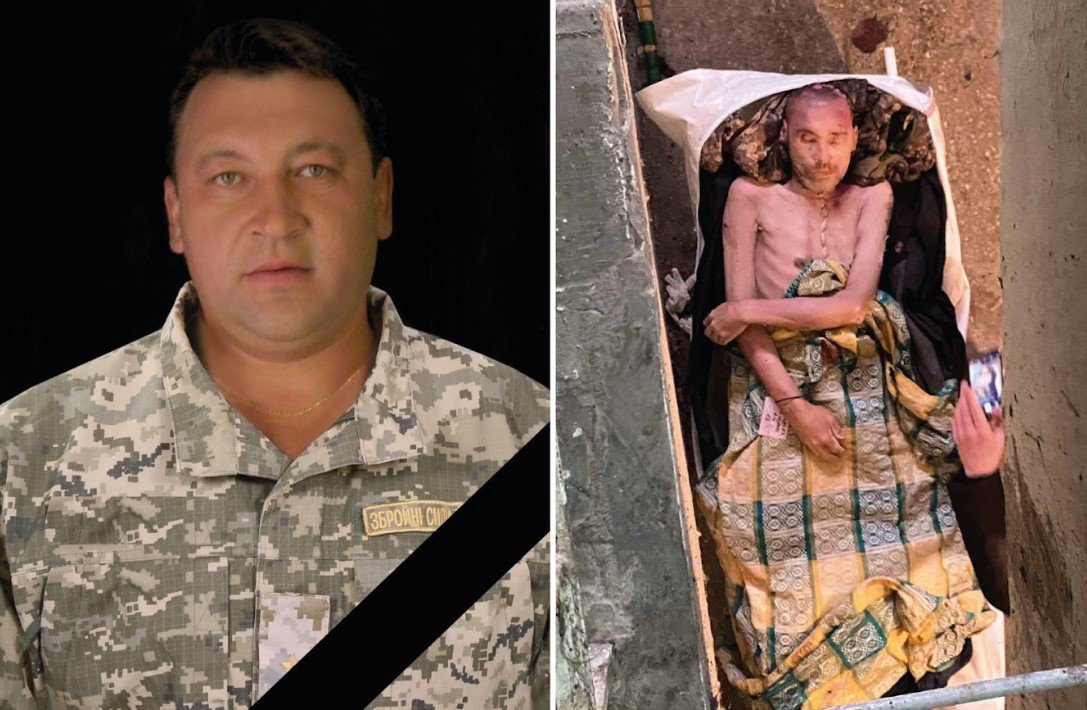
Oksana Hrytsiuk, the wife of the deceased, says:
We live in Kivertsi, Volyn region. My husband Oleksandr worked as a builder. From the first days of the full-scale war, he said, "If not me, then who?" and volunteered. He fought in the 110th brigade, named after Mark Bezruchko.
Unfortunately, on April 10, 2022, he and a group of comrades were captured near Novobakhmutivka.
I learned about his captivity from Russian websites. At first, I found one video, then another, where he was wounded and had his head bandaged.
In the fall of 2022, I received confirmation from the International Committee of the Red Cross. In September 2022, I received the only letter from my husband during all this time. It was written in Russian:
"Hello, my wife. I am in captivity in the Russian Federation. I was wounded. They feed, clothe, and provide all necessary medical assistance. I am waiting for an exchange and a quick return home."
Without a doubt, this letter was written under dictation. But even that was a great joy for me. I received confirmation that my husband was alive.
I knocked on all doors, wrote to the Coordination Headquarters, the President, the Security Service of Ukraine, and the National Information Bureau. I constantly traveled to Kyiv. I didn't just wait for him to come back from captivity, but constantly did something.
In February 2023, a released cellmate of my husband told me that he was doing well, treated more or less normally, not beaten at the moment, and could survive.
Now I understand that he said this just to not upset me. After that, there was complete silence, no news about my husband.
However, in December 2023, a representative of Lubinets (Dmytro Lubinets is the Commissioner of the Verkhovna Rada for Human Rights - Texty.org.ua) called me and said that there was an opportunity to send things and a letter to my husband. I wrote a letter, added a few photos, and sent them to the National Information Bureau. It was just before New Year's. At that moment, my husband was already dead, but I did not know it yet.
In early January 2024, I received information from another cellmate of my husband. This time, I heard that my husband was being tortured. On January 24, a Kyiv investigator called me and said there was an exchange of bodies in December 2023, and they had my husband's body.
I COULDN’T BELIEVE IT, I SAID THEY HAD MADE A MISTAKE AND HUNG UP
I couldn’t believe it; I said they had made a mistake and hung up. Later, the investigator sent me a photo of the tattoo, and I recognized him by the tattoo.
It was the worst day of my life.
When we arrived in Kyiv for body identification on January 25, I was shocked by what I saw. It was a very horrifying sight. What struck me the most was how emaciated the body was. The pathologist said that he weighed less than fifty kilograms.
Sasha was tall—180 cm. Before captivity, he weighed 110 kg and was physically healthy. What was left of him were just bones and skin. His head was all bruised, his nose was crooked, and his index fingers had no nails. Whether they were ripped out or smashed, I do not know. There were signs of torture all over his body.
His cellmates later told me how they were tortured. Every day, they were beaten. They were beaten either in the cell or taken outside. They beat them very brutally, especially my husband. Because he was tall, stately, from western Ukraine, and didn’t want to speak Russian.
BEATEN AMONG OTHER THINGS FOR NOT WANTING TO SPEAK RUSSIAN
They called him a Banderite, saying all Banderites must be killed and cut to pieces. He was beaten very cruelly, to the point of losing consciousness. Between beatings, they were forced to stand motionless for hours, sometimes with their hands raised.
They were hardly fed. Once, there was some holiday, and dogs were running in the prison yard, so the guards collected leftover dog food, added dog hair to it, and gave it to them as food.
I wrote five letters to my husband, and as I was told, he received them in the summer of 2023. In one of the letters, I wrote that he had a grandson. When he read this, he was very moved. He told the guys about it, and that day, they gave him all their food, making a small pot of it.
The date of death was recorded as November 16, 2023. According to the conclusion of our Ukrainian pathologist, it was "tuberculosis." We are going to challenge this conclusion. I know that in March, many bodies of guys were returned from captivity, and they all had tuberculosis or ischemic heart disease written as the cause of death.
For a month, I couldn't bury my husband because we disagreed with this medical certificate. And wherever I turned regarding this forensic expert's conclusion, everywhere, even at the Coordination Headquarters for the Treatment of Prisoners of War, they told me they couldn't influence the expert's decision.
When we received the death certificate, it simply said—tuberculosis. The same goes for the conclusions about the cause of death. In the Russian conclusion, it says he died in a hospital, and the cause of death was pneumonia. In our case, it says tuberculosis and lung failure.
AFTER ALL THE TORTURE IN RUSSIA, UKRAINE GAVE US A DOCUMENT STATING THAT HE DIED OF TUBERCULOSIS, AS WRITTEN BY RUSSIAN DOCTORS
I don’t understand why our side essentially accepts the Russian position, attributing the causes of death simply to illness. Just looking at him, it is clear that he was tortured. There are only bones and skin. Given all this, we said we disagreed and wouldn’t accept such a death certificate.
To make it clear, he also had Russian documents with him. The cause of death there is listed as pneumonia. And it says he died in the Vyazma Central District Hospital. And the most interesting thing: when we were issued the death certificate in Lutsk, it said: place of death, Vyazma, Vyazma Central District Hospital.
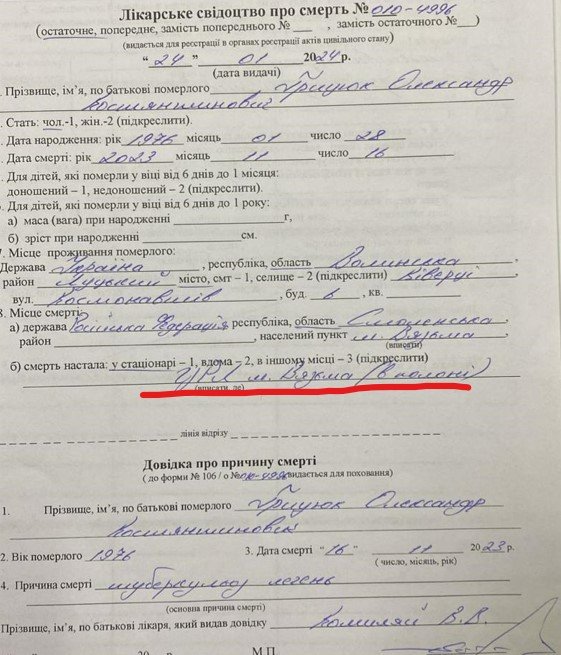
There is not a word about him being in captivity. So, it turns out that the Russian side is so humane that they took him, sick, to be treated in their hospital? And in the registry office, they responded to me: "What can we do if those were the documents he had with him?"
"What can we do if those were the documents he had with him?"
Now, the materials of the criminal case have been sent to the prosecutor's office. They have supposedly reclassified the case under Article 438, Part 1 of the Criminal Code of Ukraine (cruel treatment of prisoners of war or civilians — Texty.org.ua). I hope that proper conclusions will be drawn.
In Kivertsi, they wanted to install a memorial plaque and said, "We will write that your husband died in captivity." And I told them, "It's better not to put anything at all. My husband did not die, he was killed defending his homeland."
Vitalii Klochenko
Vitalii Klochenko from Voznesensk, Mykolaiv region, was captured in April 2022. This April, his relatives were informed that he was returned from captivity dead.
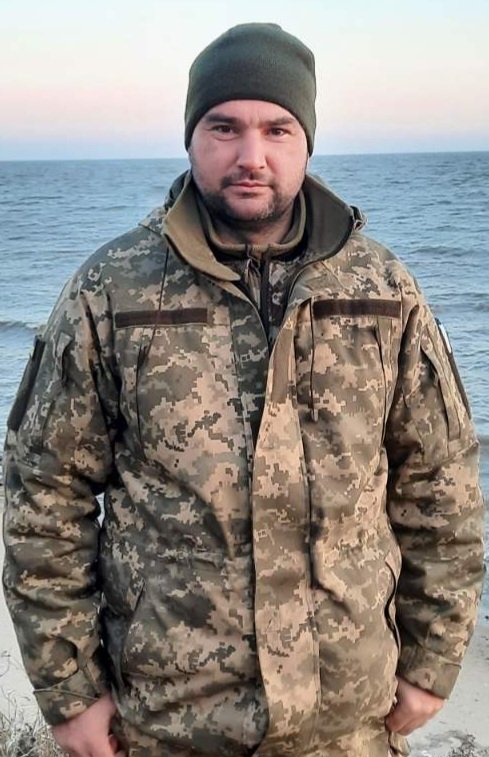
The wife of the deceased, Oksana Klochenko, shares:
My husband signed a contract on June 9, 2020, with the 36th Marine Brigade.
At first, everything was fine: he served as a reconnaissance machine gunner and performed all duties. This was not his first military experience. When everything started in the east in 2014, he received a summons. He didn't hesitate and went immediately, although I told him he could avoid it because we had a small child.
From 2014 to 2015, he was in the 28th Mechanized Brigade and had the status of a combat participant. He didn't hesitate in 2020 either, even though we had three children by then.
He wanted to join the marines and get the beret, which he didn't have time to earn. They had training, he passed everything, was very satisfied, and enjoyed it a lot.
Then, the full-scale war began. In March 2022, I found out they were in Mariupol. My husband didn't say where exactly they were, just that they were in Mariupol. We later learned they were at the Ilyich plant, from where they were captured on April 12.
He called me then, we talked for a long time, and I could hear other voices around him, it seemed everyone was calling their relatives then. It was their last chance to talk to loved ones. He didn't say they were being taken captive. He said they would try to break through, and maybe he'd call again. But he couldn't get through. Later, I learned that Vitalii was captured. A friend sent me a video where it was clear he was in captivity.
For about 8 months, we didn't even know where he was. We monitored Telegram channels, websites, and looked for information about all those released, but no one had seen him or could say where he was. But on January 1, 2023, we learned from one of the released prisoners that Vitalii was alive and was in Vyazma, Smolensk region, in Detention Center No. 2.
Then there was silence again, no one saw or heard anything. For a whole year, we knew nothing, participated in rallies, and went to the Coordination Headquarters. But there was no information about him. The only thing was that Vitalii was officially confirmed as a prisoner by the Red Cross. They confirmed him back in 2022.
Then, there was an exchange in 2024. Two released prisoners said he was sick but alive. One of these men had been with him in the same cell in 2022-2023, and the other had seen Vitalii alive just two weeks before his death.
By then, Vitalii was already suffering from tuberculosis, was very thin, and had a broken nose. But he was talking, worried about us. Overall, I noticed that those who are released from captivity do not want to talk much about all the torture.
As I was told, there was nothing good there. They lived in a basement. They were fed the same food given to pigs and only two spoonfuls. They were severely beaten. If someone fell and lost consciousness, they would place a shocker to their ear to revive them and then continue. How can one not get sick after such treatment? Moreover, the guys said that they could deliberately put a person with tuberculosis in the cell to infect others.
We contacted the Coordination Headquarters and the Security Service of Ukraine, asking to include him in the lists as critically ill.
On April 17 this year, an investigator called and offered to look at the photos, saying I mightn't have to go and could identify him that way.
The photos were really horrifying. One side of the body was already partially decomposed. On the other side, even in such a state, it was clear that he had been tortured and beaten. And the terrible thinness. Before he was captured, he was 185 cm tall and of normal build. But now, it was just shocking how thin he was.
We decided to go for the identification because the photos didn't show everything. I needed to see the legs—he had a nail deformity, and I needed to check. Only then could I be sure it was him.
His sister and I arrived at the morgue in Poltava, and it was very bad. Two days had passed since the investigator's call—the bodies were not in refrigerators, just lying in the morgue in the bags they were brought in. When we opened the bag, there was partially just mush. The smell was terrible.
THE BODIES WERE NOT IN REFRIGERATORS, JUST LYING IN THE MORGUE IN THE BAGS THEY WERE BROUGHT IN
Then, the investigator told me that in medical terms, there is no such word as torture. There are other terms, but not torture. He also said that the forensic expert did not find any signs of torture.
But before that, he told us that even not allowing someone to sleep is considered torture. I told him to look at him. There were just remains of a person, even the bones had shrunk. How can this not be called torture? His nose was broken. There were signs of injuries on his body. Everything pointed to the fact that he was beaten and tortured.
Another thing—I found out that Vitalii’s body was returned to Ukraine on March 15, but I was informed only on April 17. However, his name was written on the body bag. I asked why they didn’t call the family immediately when the body arrived in Ukraine but waited for a month. They answered that many bodies had arrived.
Once it was our turn, they informed us. But couldn’t they have stored the body properly? So that the family could come and properly take their loved one.
Then there was the burial, we took him from the morgue. Some people, even the driver of our hearse, didn’t want it filmed. We closed the doors so no one could see how and what was being put into the coffin. Because it was the first time in our city that someone had died in captivity.
Now we have another problem. The forensic expert didn’t write where exactly Vitalii died. So it turns out he died in an unknown country and unknown city. And it was written that he died simply from a disease. There is no mention that he had been in captivity for two years and was tortured there.
Based on this conclusion, I can’t get a death certificate because the place of death is not indicated. A month has passed since the funeral, but there is no death certificate. In the registry office, they say there is no information about the country or place where Vitalii died. However, the same investigator confirmed to me that he was brought from Vyazma, Russia.
No matter what, my husband didn’t just die in captivity, as written in the conclusion from tuberculosis. He bravely defended his country and died for it.
Oleksii Kretsu
From Mykolaiv region, faced the full-scale invasion in Luhansk region, where he was captured. Initially, he was taken to Detention Center No. 17 in Luhansk, and from there, he was transferred to Vyazemskoye Detention Center, where he stayed for nearly 2 years. He has returned from captivity and is currently being treated for tuberculosis and hepatitis B, which he contracted while in captivity.
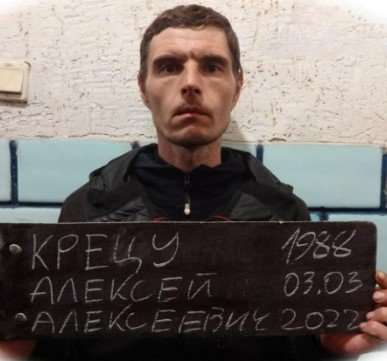
The military serviceman Oleksii Kretsu shares:
We were held for two months: first in the Luhansk Detention Center, then after a long journey, including a flight on a transport plane, we were finally brought to Vyazemskoye Detention Center. Initially, we were kept for two days with our hands tied and our eyes covered.
From what I managed to hear, a total of 256 of our prisoners were brought to this detention center. As one of the guards said, "256 snouts."
As soon as they removed the restraints from our hands and the blindfolds from our eyes, they gave us a "welcome"—beating us with shockers, batons, hands, feet, and anything else they could get hold of. After they had beaten us, they quickly gave us haircuts and a wash, which lasted a maximum of 15 seconds per person. The first ones got water as hot as boiling, and the last ones got freezing cold water. After this, we were placed in cells.
From the moment we arrived at the detention center, we were in complete informational isolation, absolutely total. However, as soon as we were brought in, they told us that we would all be shot. Because, you see, they had nothing to feed us with or nowhere to keep us. A month later, they said they wouldn't kill us but wouldn't let us return home whole either. They said some would return, but not all, and no one knew when.
About the regime in Vyazemskoye Detention Center
The treatment was terrible, and the conditions were horrific, simply unbearable.
Every single day during the morning check, we were humiliated. The same shocker was used on us without hesitation.
In the morning, from wake-up at 6:00 AM to 10:10 AM, we stood motionless in the cell. You stand facing the door: you can't even lower your head because they consider you to be sleeping. Each cell had surveillance cameras, usually two, rarely just one. Every movement was monitored.
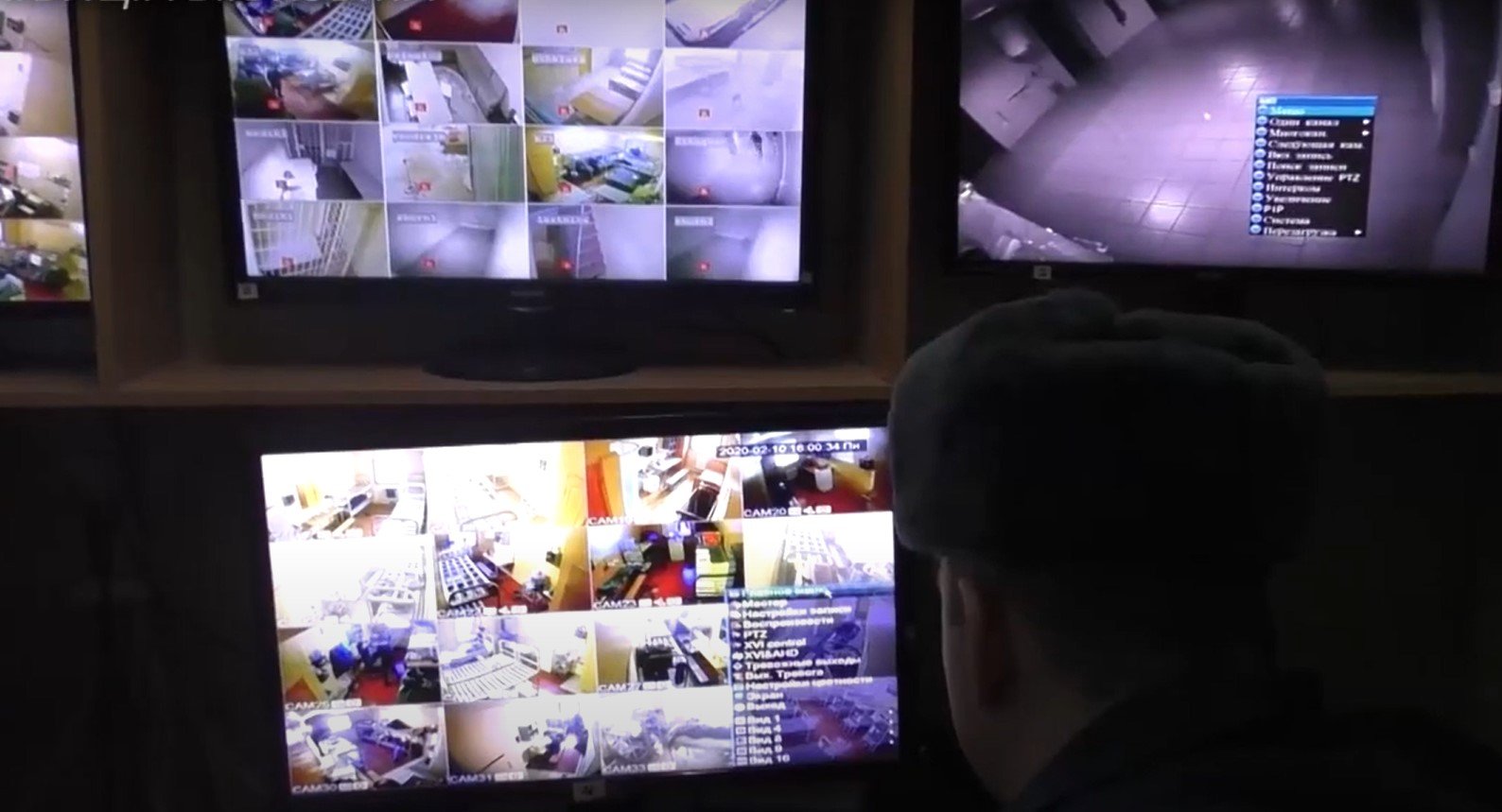
You were in trouble if you turned your head or leaned on the bed. Only the severely injured or very ill, who couldn't stand, were allowed to sit.
In winter, if it was -10 degrees outside, the cell temperature was, at best, 10-12 degrees Celsius. The small cells were mostly unheated during winter. You had to stand for hours in thin prison clothes, not moving, without any movement.
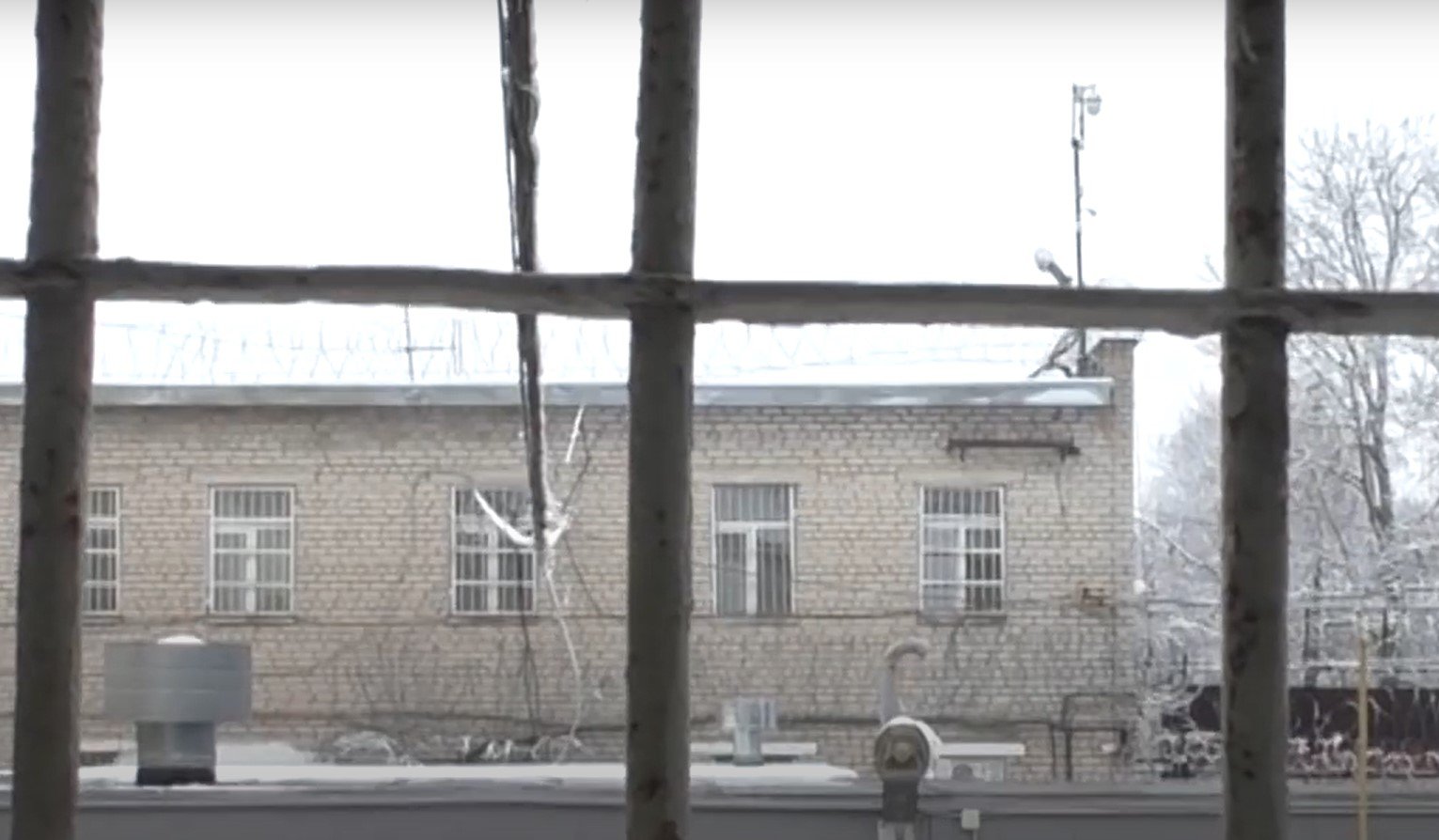
When summer and heat came, the window was tightly closed, and the radiators were heating at maximum. We were literally catching each other during formation because the guys were starting to lose consciousness.
They fed us grains soaked in boiling water and often in cold water. The only thing that tasted good was jelly with a piece of white bread. They also gave us mashed potatoes made from greenish potatoes, which were salad-colored. They served them with fish.
We were allowed to stay in the toilet for no more than three minutes. It didn't matter what you were doing there; you had only three minutes for everything.
Once every few weeks, there was a bathhouse visit. When they led us to the bathhouse — in a column, hands behind our backs, semi-bent. And God forbid anyone looked right, left, or at them. They would beat you to death. We arrived at the bathhouse, and a command sounded: "Undress!"
We undressed completely as our mothers gave birth to us. We stood in a position, as they say: legs apart, head down, hands behind the back ("dolphin" position). And there were women in their bathhouse. And they loved to beat us in the genitals with boots, stun guns, anything.
They also beat us during interrogations. I'm just a simple border guard, not an assault trooper, not a marine, not a machine gunner. And even then, I lost half of my teeth during these interrogations. And what they did to the machine gunners or snipers during interrogations — it's terrifying to imagine.
From time to time, they arranged a rotation from other cells. So the guys who were transferred told us that there was a marine-assault trooper in their cell, who was also a sniper. They beat him with a lock wrapped in an army towel, hitting him wherever they wanted. Above our cell was a cell with convicts who served in the pre-trial detention center. They played music very loudly, and the building where the interrogations took place was about 70 meters from our block. So, they beat this guy so hard that he could be heard over those speakers.
Treatment in solitary confinement
Severely ill people were transferred to solitary confinement, where the conditions were even worse. There was one guy who spent almost a year in solitary. He didn't see people at all. There weren't even mirrors there. I asked him, "How did you not go crazy there?" He said, "I found some boards and imagined they were the wolf from 'Nu, Pogodi!' and talked to them." He was transferred to solitary because he supposedly got tuberculosis.
From what I know, in solitary confinement, the Russians keep not just minor offenders but mostly mentally ill and seriously ill people. All those with tuberculosis, pneumonia, those who are rotting — they are all kept in solitary confinement.
"Sailor Zelensky"
Once, an investigator came and said: "The Russian Federation gives you a chance to declare that you are alive. This is like your hope for an exchange, write a letter home." They also gave us a template for writing a letter. It said the following:
"I, Senior Sailor Vladimir Alexandrovich Zelensky, name, patronymic, am in the captivity of the Russian Federation, I am being fed, treated, I miss you, waiting for the exchange."
It was forbidden to indicate the date, signature, or location. One of the guys decided to be smart and circled the letters V, Y, Z, M, A in his text. He did it very carefully, but the censorship of the detention center noticed it.
I thought they would kill him. But they beat him badly. After that, he limped and spoke as if his nose had been broken several times.
In 2023, we asked to write another letter. We were taken out for a walk to the prison yard, and one of us decided to ask if we could write another letter to our relatives. The fact is that we were always guarded by three lines of security.
In green — probably, the Russian Guard, in black — some of their special forces, and in purple — the detention center guards. The latter always beat us mercilessly, the special forces — occasionally, but those in green did not touch us. So it was to them that we asked if we could ask the detention center administration to give us the opportunity to write a letter.
And they were like: "Where the hell do you want to write a letter?" I replied that I was from the Mykolaiv region. They immediately said, "Where from?! Speak correctly… Learn Russian, and it will come in handy." Then they asked, from which exact settlement. I named it, and they said: "There is no such place anymore, we launched a Topol there!"
Then a guy from Odesa asked, and they answered him in the same style: "No Odesa anymore, only ruins. You must understand that everything is now Russia — Odesa region, Vinnytsia, Chernivtsi."
They also asked if there was anyone from Lviv. One guy responded. They told him: "It is not yet Russia, but it will be soon. So learn the language."
"IT IS NOT YET RUSSIA, BUT IT WILL BE SOON. SO LEARN THE LANGUAGE."
After these ten minutes of the walk, we returned to the cell, and you can understand our state. We were then in complete information isolation. But what saved us was their inherent stupidity. Because a week or two later, they turned on the radio, and there was news that the Ukrainian sabotage and reconnaissance group, with the help of the GRAD system, had shelled the Kakhovka Hydroelectric Power Plant.
And I know geography well. I told the guys in the cell that they probably haven't even taken Kherson. Because GRADs work from a distance of a maximum of 25-30 kilometers. So our GRADs couldn't be operating in such a deep rear.
"The score game"
Once, an investigator came to us and said that he needed evidence of the atrocities of the Armed Forces of Ukraine. He asked if any of us had heard or seen any atrocities by the Ukrainian military against civilians. He was talking about looting, murder, rape. They were particularly interested in Mariupol.
When I told him that I was a border guard from Luhansk, he just barked at me to shut up. Among us were marines, and they were very interested in them. But none of us knew about such cases, because they really didn't happen.
THE INVESTIGATOR CAME AND SAID HE NEEDED EVIDENCE OF THE ATROCITIES OF THE ARMED FORCES OF UKRAINE IN MARIUPOL
The investigator seemed to leave, but in the evening he returned again, asking if we remembered anything. When he realized that he would get nothing from us, he said we would "play the score game." For three nights.
What is "the score game"? It is when you stand in one position from morning till evening. They beat you whenever they want. They feed you quickly: a meal, washing dishes, and returning them should take 120-130 seconds.
But the main thing is that no one sleeps at night. The main light is turned off, the night light is turned on, everyone lies on the beds, and each one takes turns calling out their bed number. And so all night. For three nights in a row. We had one guy from Nova Odesa, and he went mad.
He started screaming: "We are on a TV show, this is all a prank. Let me out of here, I'm in Kyiv, I understand everything, this is all a prank."
A guard ran in and took him somewhere. A week later, they brought this guy back to our cell. Apparently, they started giving him injections and pills. Because he came back to our cell as a vegetable, they gave him some pills every evening, and after them, he became a real vegetable. Plus, he was all bruised and beaten.
His face was one big bruise, his eyebrow was split. On his head, he had hematomas so swollen they looked like blisters. He moved his hands like a robot; to clench his fist took him a minute and a half. We even started feeding him with a spoon. During our daily standings in the cell, they allowed him to sit.
But the guard said that if he even lowered his head, we would all be in trouble. So we constantly told him: "Don't sleep." And he couldn't even respond to us because they had drugged him so much.
Red Cross and Russian citizenship
In the eighth or ninth month, a representative of the Red Cross came to us. At least, that's how he was introduced to us. In my memory, this was the only time he came to us. Although the guys said he came again later, I personally saw him only once.
This representative of the Red Cross first asked if we wanted to get Russian Federation citizenship. Here, we decided to be cunning and started telling him that we needed to contact our families somehow to consult. Such matters can't be decided alone. Everyone has a family, a mother and a father.
THE RED CROSS REPRESENTATIVE FIRST ASKED IF WE WANTED TO GET RUSSIAN CITIZENSHIP
Then, this Red Cross representative turns to us and says, "I don't understand. Weren't you given the opportunity to contact them?" He then turns to the detention center administration and says, "Did you not give them the opportunity to contact their families? Within a day, maximum tomorrow, all prisoners should call home. Did you hear me?" They answered, "Yes, sir."
The Red Cross representative left, and half an hour later, I heard the cells opening, and all the prisoners were roughly speaking, not even beaten, but simply destroyed. Everyone, even the tuberculosis patients, is in masks.
The International Committee of the Red Cross responded to the Texts' questions and made it clear that the organisation never offers prisoners to change their citizenship. "This is not our task, nor is it the task of anyone connected in any way with the International Red Cross," the response received by the editorial office reads.
"Volyn massacre" and Mikhalkov
From the first days of imprisonment until our release, we were made to learn Russian poems, our brains were washed about how we are descendants of the traitor Hetman Mazepa, that we are descendants of Bandera, who arranged massacres and killed women and children. All this was detailed on A4 sheets given to us for learning.
One of them told the story of the "Volyn massacre." In particular, there was a story about how Bandera's henchmen brought their superior five severed heads of Poles as a gift. There was also a leaflet called "Odessa Khatyn" about the burning of pro-Russian militants in the House of Trade Unions.
THEY WASHED OUR BRAINS ABOUT HOW WE ARE DESCENDANTS OF THE TRAITOR HETMAN MAZEPA
They also played the radio for us. The program "Besogon" (authored by Russian director Nikita Mikhalkov) was top-rated among the guards. So, once from it, we learned that all Jews in Kyiv during World War II were shot by Ukrainians. And in general, Ukrainians were Hitler's henchmen and are descendants of policemen.
Plus, in the morning, there was the Russian anthem before breakfast, the anthem after breakfast, and the same story with lunch and dinner. And before bedtime, also the anthem.
They also conducted physical exercises with us. At first, it lasted an hour and a half, but with limited food and constant beatings, the guys lost consciousness during the exercises. At some point, they reduced the exercise time to half an hour. However, it was still another form of abuse. A guard could walk down the common corridor and suddenly command everyone to do fifty push-ups and count loudly.
But the strength was not there: some simulated push-ups, some tried to hide in the dead zone from the camera. But if the guards noticed this, they took them out of the cell, beat them with a stun gun, and kicked them. They would tauntingly say: "You think you are so smart? You are marines, you are supposed to be the elite."
Every evening, when I lay down to sleep, I dreamed of waking up somewhere in a sanatorium or not waking up at all.
Testimony about Oleksandr Hrytsiuk
The first death I witnessed happened in December. It was Hrytsiuk from Volyn (we began the article with the story of Oleksandr's wife). Sometime in December, in the middle of the night, the cell door opened, and we accidentally heard a dialogue.
One of the convicts working in the housekeeping unit said to the guard: "Boss, I'm afraid to go in there."
To which he replied: "You're afraid of the living, nothing to fear from the dead."
About 5-6 hours before that, we watched one of the guards approach the solitary cell where Hrytsiuk was held, worriedly saying they would bring him proper food. From the tone, it was clear that Hrytsiuk was already in a critical condition.
There was no question of staying in any Vyazma hospital.
In the morning, we heard the medic say to write down the surname Hrytsiuk or Hrytsiv.
Texty.org.ua: From Kretsu's description, it can be assumed that Hrytsiuk died in detention center No. 2, not in the inpatient department of the Vyazma Central Hospital. It is a great pity that the Ukrainian side, without any critical understanding, apparently simply duplicated the information from the Russians that Hrytsiuk was supposedly still alive when taken to the Vyazma hospital. Thus, they tried to hide the fact that in a critical condition, he was not provided with medical assistance. Recall, according to Kretsu, the detention center's medic inquired about Hrytsiuk's fate only in the morning. The physical appearance of Hrytsiuk's body convincingly indicates that the prisoner was deliberately starved and, as other prisoners note, systematically beaten.
Testimony about Vitalii Klochenko
Vitalii Klochenko was a man with character. He had his own opinion on everything, and he stood by it. And all the rot from the detention center didn't like such people. They killed and tortured such people. Especially machine gunners, grenade launchers, and MANPADS operators. To pin murders and rapes, atrocities in Mariupol on them. And some gave in.
This man could not be broken morally. So they killed him physically.
I spent time with him in the cell from around, let me say precisely, from April 2022 to January 27, 2023. He was a healthy guy, physically developed, aggressive towards everything, with his unyielding point of view.
About three months later, when we were transferred to the first floor to the coldest cell, like tuberculosis patients, we heard how he was being led to the bathhouse, and he was limping. They constantly told him: "Klochenko, hurry up, limp." I understand this was the result of interrogations.
They couldn't break him morally to take responsibility for murders or atrocities. So they killed him physically.
They overdid it a bit, you know? Because there are sadists there. Filth and inhumans.
What doesn't let go
Now, I'm being treated for tuberculosis. It has been three months since I started treatment. I'm currently on experimental drugs. But what worries me more than tuberculosis is something else. I still can't recover from all of this. Sometimes, it overwhelms me. Plus, I often dream of falling asleep here and waking up there. And it is so scary that I wake up in a cold sweat. It doesn't let me go.
Detention center No. 2 in faces
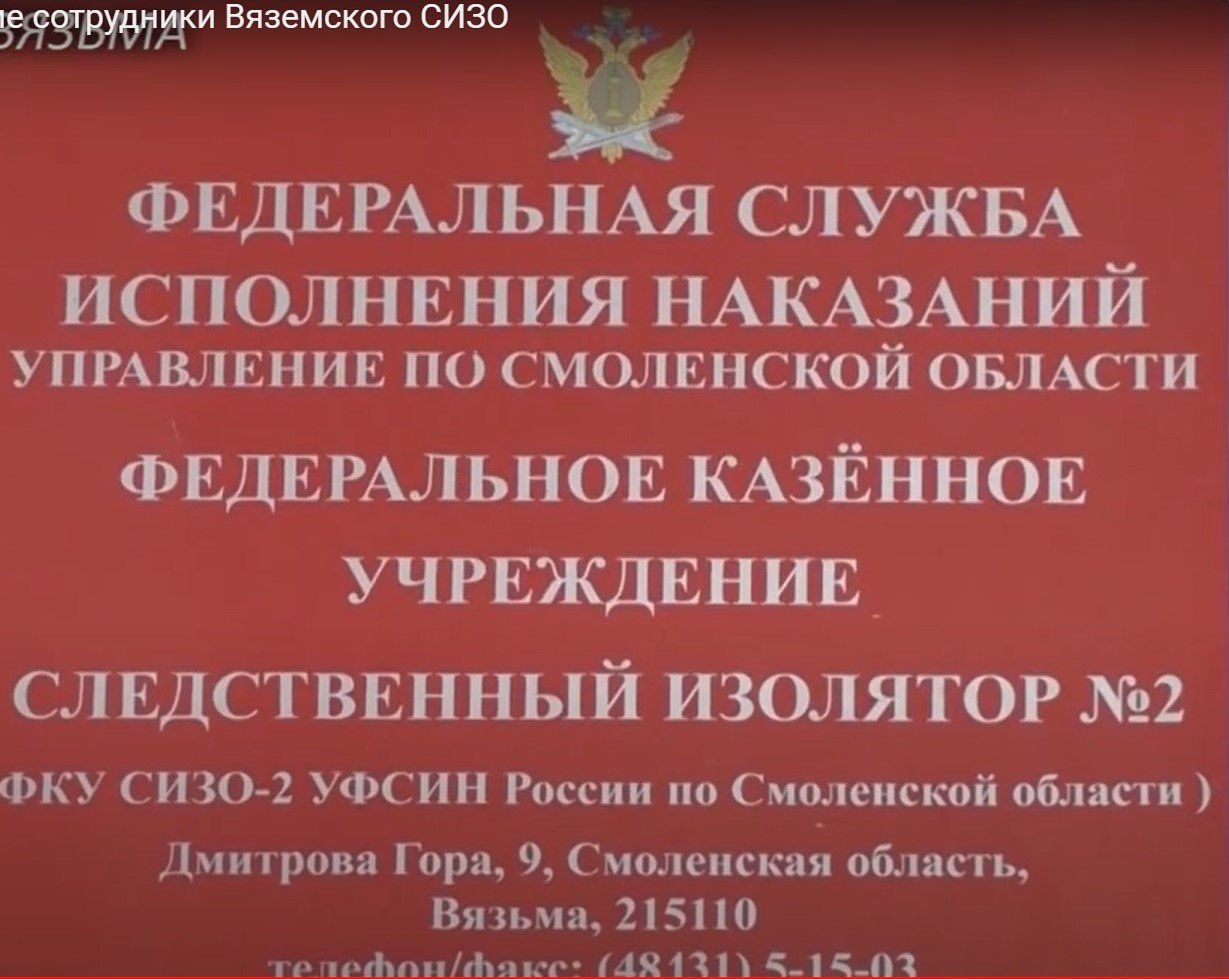
According to media reports and relevant social media pages, the Vyazma Detention Center No. 2, before the full-scale invasion, led its usual Russian-Gulag life. Of course, there was practically no writing about the life, health, or conditions of the detainees.
However, the lives of the ordinary staff were covered quite extensively. There were detailed reports on the ceremonial induction of new employees at some World War II landmarks significant to Russians, participation in sports events, and the celebration of various odd anniversaries. It was not possible to find the usual school excursions to penitentiary institutions typical of Russian life, but they are more likely to be sent to correctional colonies for familiarization.
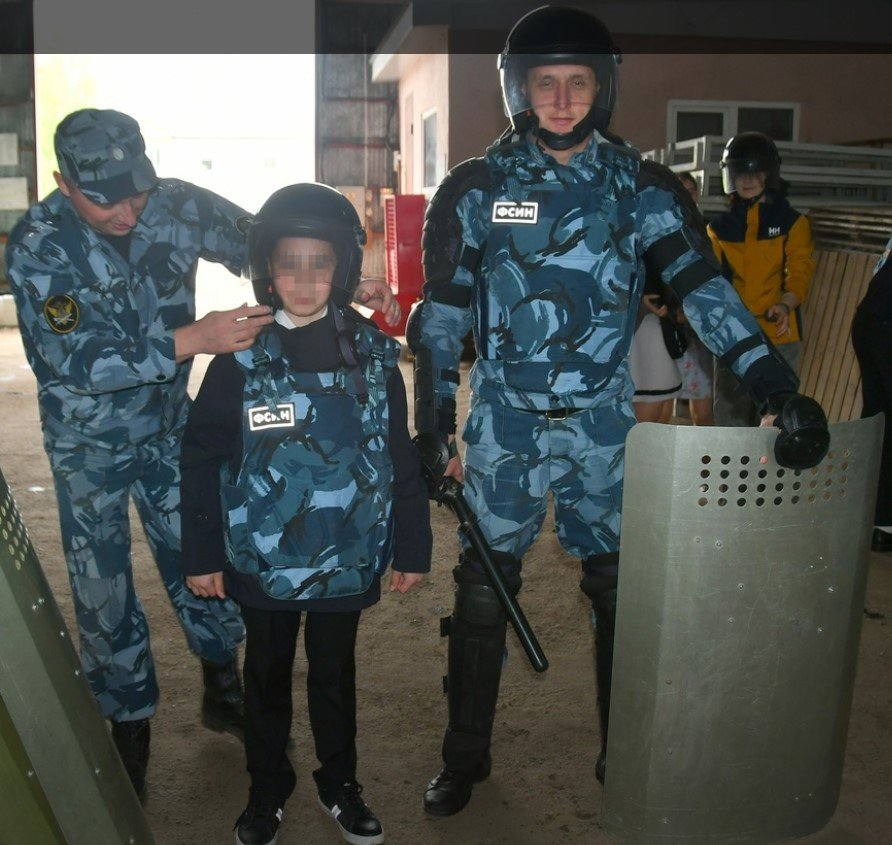
However, there was one notable feature about this facility. Right before the full-scale invasion, they built a new wing for more than 200 people.
With the start of the full-scale invasion, the informational activity around Detention Center No. 2 quickly declined. There is almost no public information about it. It seems that its leaders are being replaced, but it is unclear exactly when and under what circumstances these changes occur.
It can be said with some certainty that Viktor Naumenko was the head of this detention center in 2022.
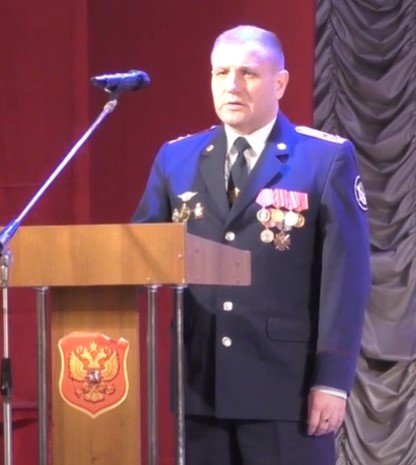
Then, several deputies took his place until, eventually, the position was filled by a representative of the detention center administration, Alexei Zakharov. We will write more about him later.
For the past several years, Andrey Martynov has consistently held leadership positions in the detention center. As of early 2024, he held the position of deputy head of the detention center.
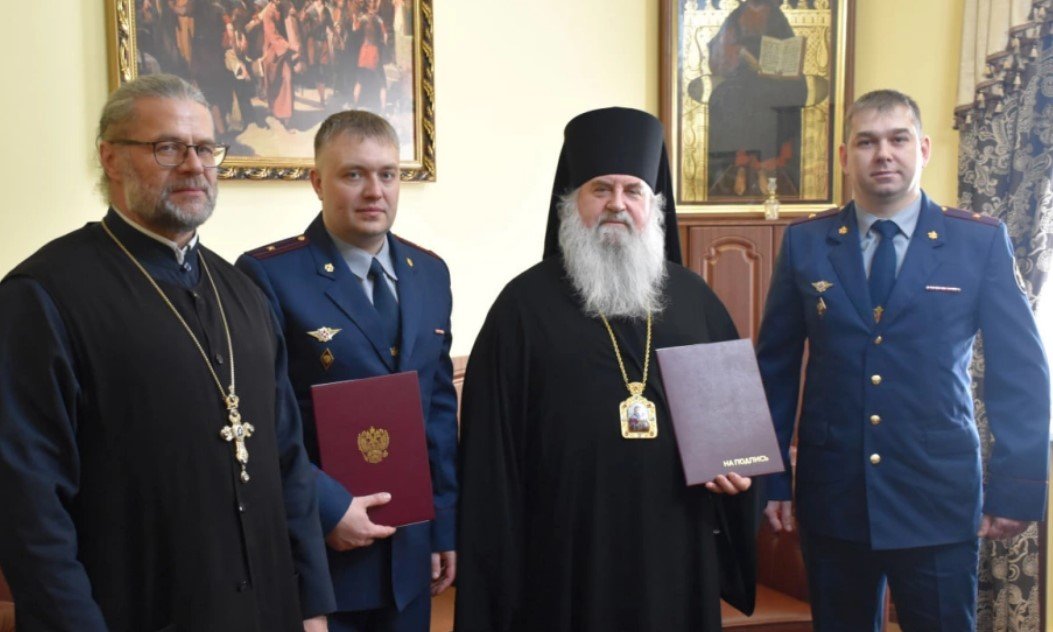
It is also worth mentioning the direct head of all the detention centers in the Smolensk region. This refers to the head of the "UFSIN" (Federal Penitentiary Service Administration) for the Smolensk region, Alexander Trachuk. Here he is in his "parade" photograph, adorned with badges and ribbons of orders for his heroic service.
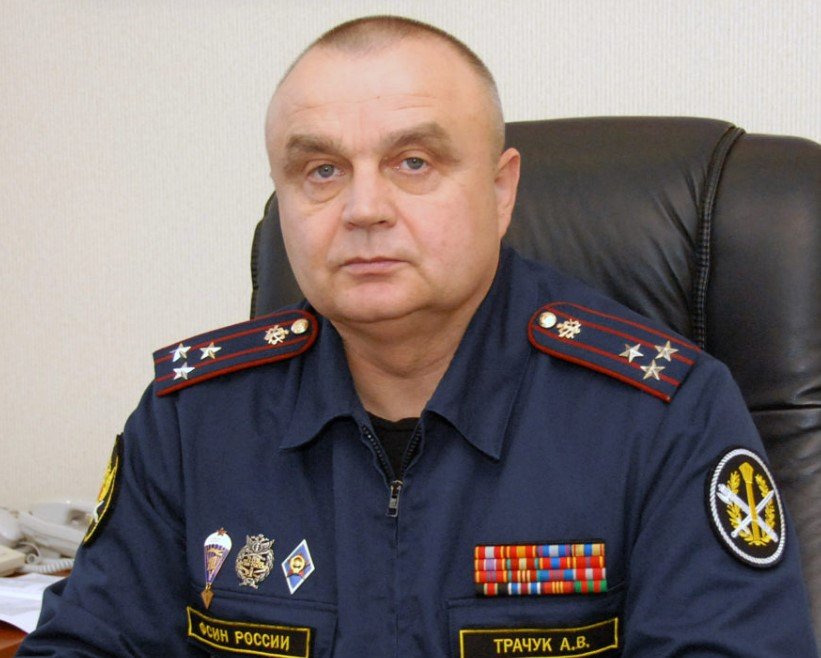
There is an interesting detail about Alexander Trachuk. According to Russian media, he was born in Ukraine, specifically in the Odesa region. However, this does not prevent him from "fruitfully" working for a system that destroys and breaks Ukrainian prisoners.
Now, it is worth returning to the figure of Alexei Zakharov, the current acting head of the Vyazma detention center.
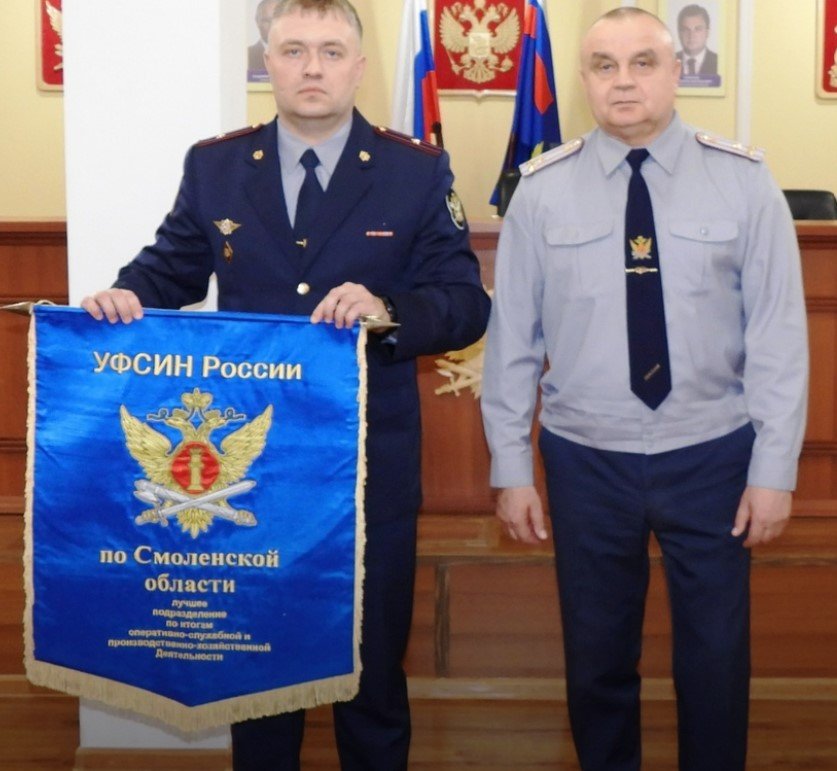
It was Zakharov, according to Oleksii Kretzu, who was present during the intake of Ukrainian prisoners to the detention center, and it is most likely that he was one of the leaders of the shameful procedure of beating and humiliating the Ukrainian prisoners.
Here's what Kretzu recalls: "They dragged me into some basement and started beating me. Then they removed the ties from my hands, cut the tape from my eyes, and after that, they took me out into a white corridor. There, two masked men were already standing, and this 'cupboard' (Alexei Zakharov - Texty.org.ua) without a mask.
He was the only one without a mask and balaclava. And it was he who asked me, 'Who are you?' I replied that I was a border guard, to which he responded, 'Got it, you Nazi scum, take him away.' After that, they took me to a place where they twisted my arms and demanded I sign something. From the text, I saw only one word - 'guilty.' Meanwhile, they continued to beat me."
As for the perpetrators of the beatings themselves, in this case, we are talking about individuals so 'gray' and devoid of any (except, of course, a tendency towards sadism) qualities that it is difficult to find any interesting or valuable information about them. Perhaps, except for obituaries. Here's an obituary for one of them.
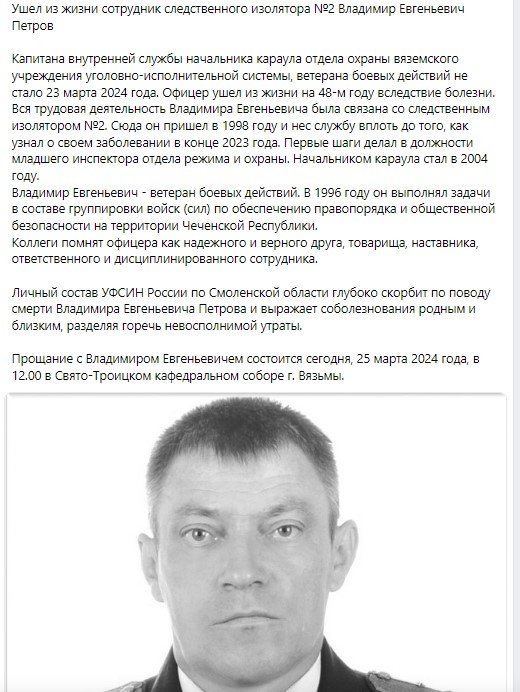
As we can see, Vladimir Petrov's life path is quite typical for an employee of the Russian punitive prison system. Service in Chechnya, where multiple cases of human rights violations were recorded, and then endless service in the Vyazma detention center.
Separately, it is worth mentioning the representatives of the Russian state service who call themselves "church ministers of the Russian Orthodox Church." On the pages of Vyazma media, one can find many mentions of some cooperation agreements between the Vyazma diocese and Detention Center-2.
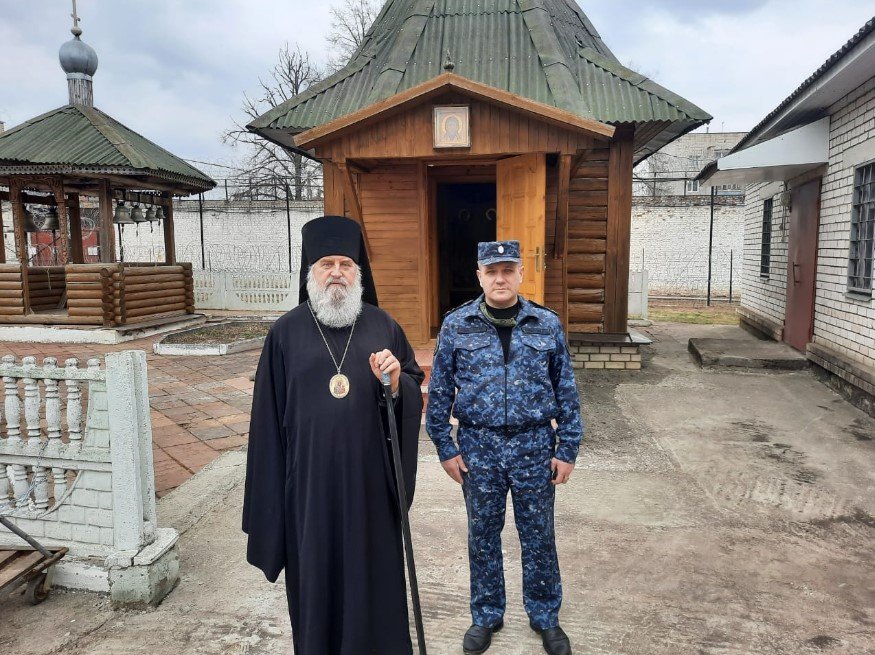
However, the "pastoral" cooperation of the ROC ministers and the representatives of the administration of Detention Center-2 did not in any way improve the quality of life for the Ukrainian prisoners. They are still beaten, deprived of food, and mocked. According to Kretzu, the prisoners only received crosses, and there were supposed to be two or three Bibles in the detention center, for the reading of which one had to queue.
Across all detention centers in Russia
One might think that Detention Center-2 in Vyazma plays a unique role in the torture of Ukrainian prisoners, but that is not the case. Similar things are likely happening in every Russian detention center where Ukrainian prisoners are held. According to the Media Initiative for Human Rights, today, Ukrainian prisoners are held in 42 pre-trial detention centers and correctional colonies in Russia. They are located both in the regions bordering Ukraine and deep within the country. On the eve of the full-scale invasion or after February 24, 2022, they were cleared of Russian citizens. Russian detainees remained in these places as staff.
To understand how widespread and typical this practice is in other places where Ukrainian prisoners are held, TEXTY spoke with the parents of another Ukrainian soldier who died in Russian captivity. Sviatoslav Saltykov, a 22-year-old saxophonist of the military band of the 36th Separate Marine Brigade, was captured in Mariupol in the first half of 2022.
Just before the war, their band went to Mariupol on tour, where the war caught them. Despite being musicians, the band members and Sviatoslav primarily took an active part in the defense of the city. Unfortunately, they were captured and eventually ended up in the detention center of the Russian city of Kineshma.
His mother, Maryna Saltykova, shares:
We learned about what was happening in the detention center from a young man who was released from captivity and was undergoing rehabilitation because he was in bad shape. They were fed very poorly. They were forced to stand all day, beaten with stun guns and batons. For any reason and without reason. If they looked the wrong way, raised their head, or said something. They had video surveillance cameras everywhere. If something was wrong, guards immediately ran into the cell and beat them. They were beaten during walks. Forced to squat and do push-ups.
We know that the guards forced our son to sing. He had a good ear, memory, and voice. At home, he didn't sing, but he knew many songs.
The medical death certificate stated that he supposedly had a heart problem. But at home, he was normally engaged in sports and rode a bicycle.
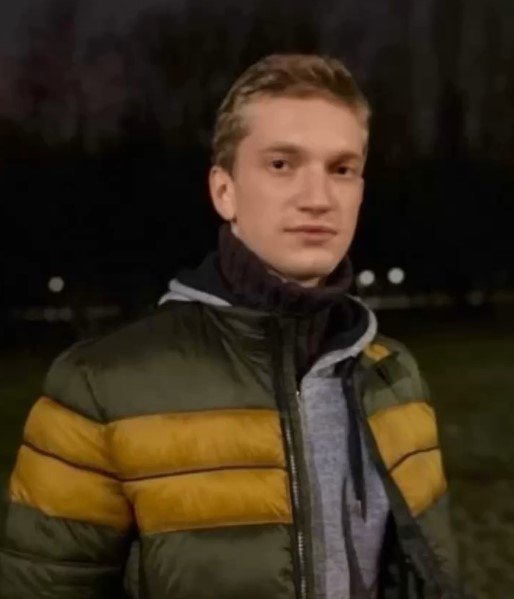
He had certain problems with the blood vessels in his nose, and at home, he sometimes had nosebleeds. Those who were with him in the cell said that he had headaches from time to time. Maybe he started having blood pressure problems. They didn't spare anyone much. They hit him on the back, neck, and legs. The guy who returned from captivity and gave us the information couldn't even walk when he came back.
If a person had any health problems, everything immediately worsened there. And regardless of whether they were sick or had any issues, they were still beaten.
From what we were told, by the fall, our son was already weak, and he had constant nosebleeds. Yet they continued to force him to squat, stand, and do other things. One day, they came, and there was a puddle of blood by his bed. Then, he was taken somewhere to a separate cell. They say he was so weak that he couldn't even carry his belongings with him.
The guys supposedly overheard a conversation between the guards: "I hit him, and he fell. I thought he was pretending, but he died."
He was moved to a solitary cell, most likely so that he would die there.
The guys spoke very well of him. Both when they were in Mariupol and in captivity. He supported others morally, saying everything would be fine and everyone would get out of captivity.
TEXTY: Considering all the terrible facts presented and that such things happen in different corners of Russia, it is quite clear that this is not about an "excess of the executor" but about an absolutely clear state policy of Russia aimed at destroying both Ukrainian defenders and peaceful citizens. The goal of this policy is clear and obvious - the physical destruction of Ukrainians and their moral breakdown. All of this fits clearly into the policy of the Russian state and has a specific name - "genocide."
This article was originally written in Ukrainian. It has been translated into English using AI tools such as DeepL, ChatGPT, and Grammarly. If you encounter an error that requires immediate attention, please inform us via Facebook, Twitter, or Instagram. Your understanding and support are appreciated.

